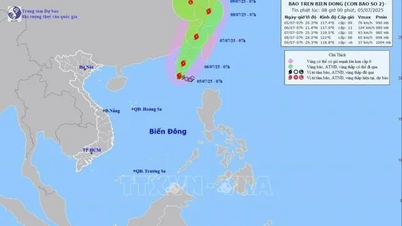
Pursuant to Decision No. 20/2025/QD-TTg dated July 1, 2025 of the Prime Minister on promulgating the list of important data and core data, the Ministry of Culture, Sports and Tourism requests agencies and units to implement a number of contents:
Organize dissemination of the contents of Decision No. 20/2025/QD-TTg dated July 1, 2025 of the Prime Minister on promulgating the list of important data and core data to all cadres, civil servants and public employees in agencies and units to clearly understand the role, significance and requirements for deploying open data in public service activities.
In addition, the organization reviews, classifies and catalogs important data and core data according to each assigned management field, ensuring full implementation according to regulations; proposes authorized authorities to amend and supplement the data catalog (if any).
At the same time, closely coordinate with competent authorities and relevant agencies in the process of deploying, updating, publicizing data or securing data information according to the provisions of law; coordinate in providing information and reporting when requested.
*Previously, Deputy Prime Minister Nguyen Chi Dung signed Decision No. 20/2025/QD-TTg of the Prime Minister promulgating the list of important data and core data.
activate, the Prime Minister issued 26 core data and 18 important data.
26 core data includes:
1-Data on national borders and territorial sovereignty collected and managed by state agencies is not yet public.
2- Data on strategies, projects, and plans for science, technology, and innovation development in the fields of national defense, security, and cryptography of state agencies have not been made public.
3- Data on defense and security industry activities is not yet public.
4- Data on investment and procurement activities in the fields of defense, security, cryptography, and national reserves are not yet public.
5- Data on military, defense, security, cryptographic works, and important works related to national security that have not been made public.
6- Data on strategies, policies, procedures and activities for monitoring, preventing and responding to cybersecurity incidents and protecting critical information infrastructure of state agencies have not been made public.
7- Data on radio frequency planning for national defense, security, cryptography, and Party agencies has not been made public.
8- Statistical data on the environment serving national defense and security activities collected and managed by state agencies are not yet public.
9- Statistical data on hydrometeorology serving national defense and security activities collected and managed by state agencies are not yet public.
10- Data on Party activities collected and managed by Party agencies is not yet public.
11- Data on foreign information of state agencies is not yet public.
12- Data transferred by foreign agencies, organizations, and international organizations under international treaties of which the Socialist Republic of Vietnam is a member and needs to be protected, but has not been made public.
13- Data on the activities of Vietnamese representative agencies abroad managed by state agencies has not been made public.
14- Data on the organizational structure projects of ministries, branches and localities has not been made public.
15- Data on cadres, civil servants, state employees, people's armed forces, and people working in key organizations has not been made public.
16- Data on Ethiopia, beliefs and religions managed by state agencies is not yet public.
17- Data on water resources and rare minerals collected and managed by state agencies is not yet public.
18- Geospatial data, aerial photo data and remote sensing data of key areas and locations serving national defense, security and cryptography collected and managed by state agencies have not been made public.
19- Data on land, sea and islands collected and managed by state agencies is not yet public.
20- Data in the financial and budgetary fields collected and managed by state agencies is not yet public.
21- Data on the quantity and operating areas of fishing vessels for aquatic and marine products collected and managed by state agencies have not been made public.
22- Data on plans, strategies, projects, and development projects for ethnic minorities collected and managed by state agencies are not yet public.
23- Data on the activities of the People's Court, People's Procuracy, and State Audit collected and managed by state agencies has not been made public.
24- Data on atomic energy, nuclear and radiation safety, national energy, plans, strategies, projects, and national energy development projects collected and managed by state agencies have not been made public.
25- Medical data collected and managed by state agencies is not yet public.
26- Data on organizations and citizens is not yet public.
Important data categories include:
1- 26 Core data above.
2- Data on settlement, complaint and denunciation and corruption prevention and control collected and managed by state agencies has not been made public.
3- Data on investigation, combat, prevention of crimes, violations of national security and handling of administrative violations collected and managed by state agencies have not been made public.
4- Data in the field of internal affairs collected and managed by state agencies is not yet public.
5- Data in the field of transportation collected and managed by state agencies is not yet public.
6- Data on works and performances by which the State represents the copyright owner and related rights owners and is collected and managed by state agencies has not been made public.
7- Data on science, technology, and innovation activities collected and managed by state agencies have not been made public, except for data (on strategies, projects, and plans for science, technology, and innovation development in the fields of national defense, security, and cryptography of state agencies that have not been made public).
8- Data on investigation and resolution of environmental incidents have not been concluded by competent state agencies.
9- Data in the financial and banking sectors of state agencies is not yet public.
10- Data on social insurance funds, health insurance, and unemployment insurance collected and managed by state agencies is not yet public.
11- Data on industry and strategic materials collected and managed by state agencies has not been made public.
12- Data in the field of agriculture and rural development collected and managed by state agencies is not yet public.
13- Data on foreign investment of state-owned enterprises is not yet public.
14- Data in the field of information and communication collected and managed by state agencies is not yet public.
15- Data in the field of education and training collected and managed by state agencies is not yet public.
16- Biosafety data collected and managed by state agencies is not yet public.
17- Data in the fields of labor, meritorious people and society collected and managed by state agencies is not yet public.
18- Data on organizations and citizens is not yet public.
The Prime Minister requests the Ministry of Public Security to organize, guide, inspect and urge the implementation of this Decision; front over and coordinate with relevant agencies to synthesize, review, propose amendments and supplements to the Decision and submit it to the Prime Minister for approval.
The Ministry of National Defense is responsible for guiding, inspecting and urging the implementation of this Decision for data in the military, defense and cryptographic fields.
Ministries, ministerial-level agencies, government agencies, and People's Committees of provinces and centrally run cities are responsible for guiding agencies, organizations, and individuals to classify important data and core data in their fields and areas of management; coordinate with the Ministry of Public Security to propose amendments and supplements to the list of important data and core data.
* Decree 165/2025/ND-CP dated June 30, 2025 specifically stipulates criteria for determining important data and core data.
Criteria for determining important data:
Determining important data is based on the level of impact that the data may have on national defense, security, cryptography, foreign affairs, macroeconomics, social stability, health and public safety when illicit collected or used (excluding state secrets), including:
1- Data that may have dangerous impacts on national security, independence, sovereignty, unity and territorial integrity of the Fatherland, protection of the Party, State, and national unity; protection of political security and security in the fields of ideology - culture, economy, national defense, foreign affairs, information, society, resources, environment, agriculture, biology, health, labor, construction, education, training, science and technology.
2- Data can have dangerous impacts on foreign relations development plans, affecting national interests and international cooperation security, Vietnam's investment projects abroad, energy security, and maritime security.
3- Data can have dangerous impacts on the development, operation of the macro economy, important economic sectors of the country, total supply, total demand of society, total national economic value, unemployment rate, monetary sector, trade, export, import, supply of essential goods, products and services.
4- Data that may have dangerous impacts on the life, health, honor, dignity, property, rights, and legitimate interests of agencies, organizations, and individuals; disease prevention, prevention, monitoring, and treatment of infectious diseases, occupational diseases, food safety and hygiene; labor supply, and provision of public services.
Criteria for defining core data:
The determination of core data is based on the direct impact of data that endangers national defense, security, cryptography, foreign affairs, macroeconomics, social stability, health and public safety when illicit collected and used (excluding state secrets), including:
1- Data directly causes dangerous impacts on national security, independence, sovereignty, unity and territorial integrity of the Fatherland, protecting the Party, the State, and the great national unity bloc; protecting political security and security in the fields of ideology - culture, economy, national defense, foreign affairs, information, society, resources, environment, agriculture, biology, health, labor, construction, education, training, science and technology.
2- Direct data has a dangerous impact on foreign relations development plans, affecting national interests and international cooperation security, Vietnam's investment projects abroad, energy security, and maritime security.
3- Direct data has a dangerous impact on the development and operation of the macro economy, the country's important economic sectors, the total supply and demand of society, the total national economic value, the unemployment rate, the monetary sector, trade, export, import, supply of essential goods, products and services.
4- Data directly causes dangerous impacts on the life, health, honor, dignity, property, rights, and legitimate interests of agencies, organizations, and individuals; disease prevention, prevention, monitoring, and treatment of infectious diseases, occupational diseases, food safety and hygiene; labor supply, and provision of public services.
Source: https://baovanhoa.vn/van-hoa/khan-truong-thuc-hien-quyet-dinh-ve-danh-muc-du-lieu-quan-trong-va-du-lieu-cot-loi-149276.html






























































































![[OCOP REVIEW] Bay Quyen sticky rice cake: A hometown specialty that has reached new heights thanks to its brand reputation](https://vphoto.vietnam.vn/thumb/402x226/vietnam/resource/IMAGE/2025/7/3/1a7e35c028bf46199ee1ec6b3ba0069e)










Comment (0)